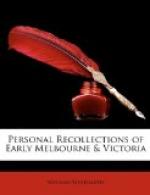Another feature of this Sydney ultra party—a curious feature, indeed, to look back upon to-day—was its undisguised antipathy to the anti-transportation feeling then gathering force throughout South-Eastern Australia, and even in Tasmania. The movement was highly unfashionable, say even deeply vulgar, in the leading circle surrounding Government House. For those who had the infirmity of such puritanical leanings there was an approach to the antipathy, plus contempt, of the southern slaver of the States for his northern abolitionist countryman. When my friend, Mr. (afterwards Sir) S.A. Donaldson introduced me, for my temporary stay, at the Australian Club, then the high quarters of the party, he passed me a friendly hint to steer clear, at least when on the floor of that “house,” of that delicate subject.
This feeling was further and rather amusingly illustrated on one occasion during the “Separation Session,” at which I was the member for Melbourne, and present at the time. Mr. Henry Moor, the well-known solicitor, and one of the five district members, in replying to the charge urged against us of the unfilial indifference or ingratitude of Port Phillip in thus seeking separation, instanced for the contrary the recent event of the arrival from Melbourne of a deputation from the Anti-Transportation League, in order to help Sydney in promoting its good cause. The instant his drift was detected, the Speaker, Dr. (Sir Charles) Nicholson, apprehensive, doubtless, of some undesirable scene on that too sensational subject, rose to call peremptorily the honourable member to order, and to the non-transgression of his proper subject. But all this injuriously exclusive faction had entirely disappeared from that open and genial society of Sydney which welcomed Mr. Froude three years ago, and which he describes so pleasantly.
CHEAP LIVING.
“All cheering Plenty, with his flowing horn,
Led yellow Autumn, wreathed with nodding corn.”
—Burns.
After the first few years of disturbing land speculation, and a too general extravagance of living, we settled down into a frugal folk, of moderate but steady prosperity, which lasted up to the general unsettlement of everything by the gold. The general moderation, and the cheap and plenty time that characterized it, culminated in 1844, when bread was 4 pence the 4-pound loaf, rich fresh butter 3 pence a pound, and beef and mutton 1 penny. A good managing lady, with whom I lodged in that year, told me one day at dinner that a savoury dish we were enjoying was a bullock’s head, got for nothing from her butcher, and with which she hoped to keep the house for yet two more days. Shortly before this, when my friend Fennell and I housed together at the west end of the town, we sent one day to the neighbouring slaughtering-place, where the custom was to sell by retail to the public the legs of mutton at 5 pence each, as they had comparatively so little of tallow for boiling down. We duly got one, cooked it, and found it very good.




